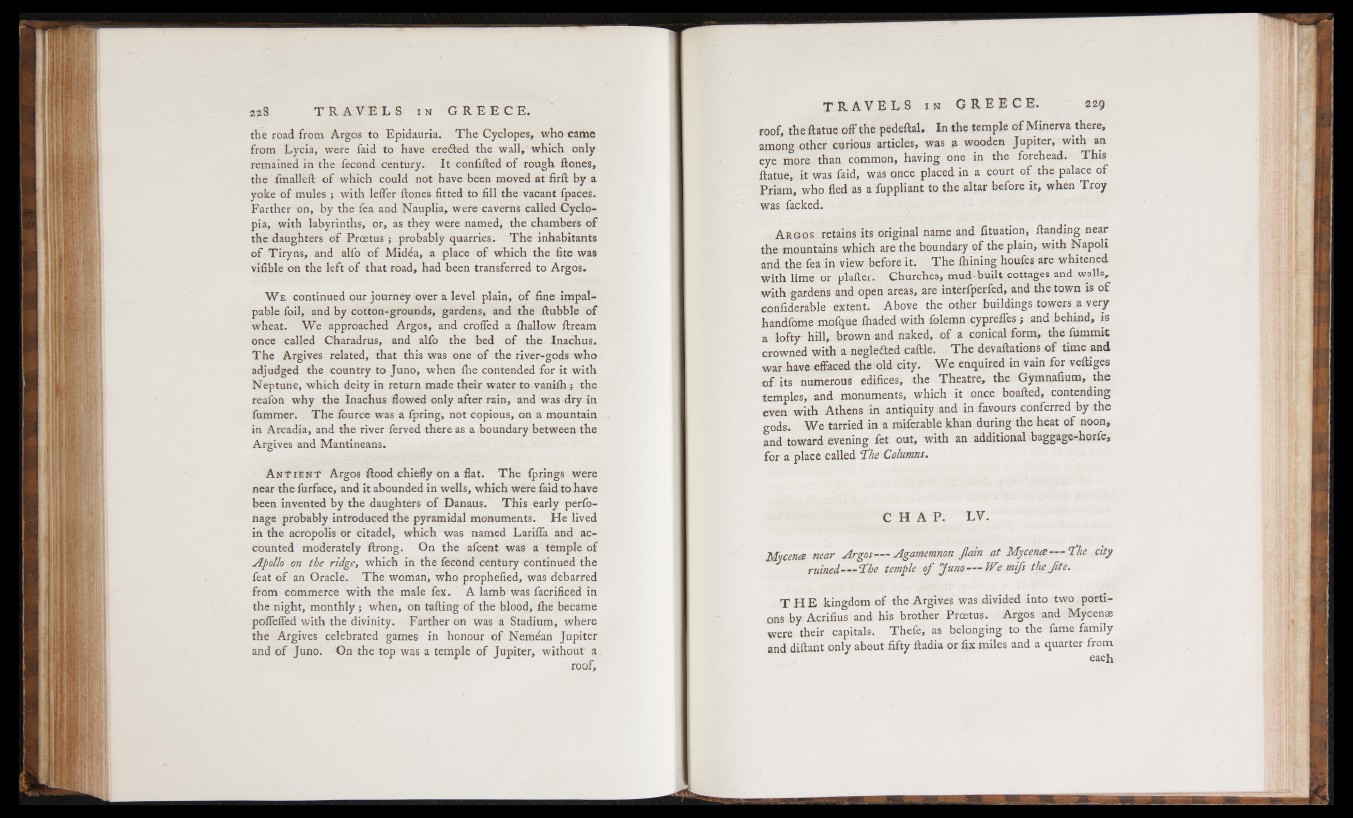
the road from Argos to. Epidauria. The Cyclopes, who came
from Lycia, were faid to have eredted the wall,'which only
remained in the .fécond century. It confifted of rough ftones,
the fmalleft o f which could not have been moved at firft by a
yoke of mules j with lèffer ftones fitted to fill the vacant fpaces.
Farther on, by the fea and Nauplia, were caverns called Cyclopia,
with labyrinths, or, as they were named, the chambers o f
the daughters of Prcetus j probably quarries. The inhabitants
of Tiryns, and alfo o f Midéa, a place o f which the fite was
vifible on the left of that road, had been transferred to Argos.
W e continued our journey over a level plain, o f fine impalpable
foil,, and by cotton-grounds, gardens, and the ftubble of
wheat. We approached Argos, and croffed a fliallow ftream
once called Charadrus, and alfo the bed o f the Inachus.
The Argives related, that this was one o f the river-gods who
adjudged the country to Juno, when {he contended for it with
Neptune, which deity in return made their water to vanifti$ the
reafoft why the Inachus flowed only after rain, and was dry in
fummer. The iouree was a fpring, not Copious, on a mountain
in Arcadia, and the river ferved there as a boundary between the
Argives and Mantineans.
A n tie NT Argos flood chiefly on a flat. The fprings were
near the furface, and it abounded in wells, which were faid to have
been invented by the daughters o f Danaus. This early perfo-
nage probably introduced the pyramidal monuments. He lived
in the acropolis or citadel, which was named Larifia and accounted
moderately ftrong. On the afoent was a temple of
Apollo on the ridge, which in the fécond century continued the
feat o f an Oracle... Thé woman, who prophefied, was debarred
from commerce with the male fex. A lamb was facrificed in
the night, monthly ; when, on tailing o f the blood, Ihe became
pofleflfed with the divinity. Farther on was a Stadium, where
the Argives celebrated games in honour o f Neméan Jupiter
and o f Juno. On the top was a temple of Jupiter, without a
roof, the ftatue off thé pedeftal. In the temple of Minerva there,
among other curious articles, was a wooden Jupiter, with an
eye more than common, having one in the forehead. This
ftatue, it was faid, was once placed in a court of the palace of
Priam, who fled as a fuppliant to the altar before it, when Troy
was facked.
Argos retains its original name and fituation, Handing near
the mountains which are the boundary of the plain, with Napoli
and the fea in view before it. The fhining houfes are whitened
with lime or plafter. Churches, mud-built cottages and walls,
with gardens and open areas, are interfperfed, and the town is o f
confiderable extent. Above the other buildings towers a very
handfome mfifqMe lhaded with folemn cypreffes j and behind, is
a lofty hill, brown and naked, o f a conical form, the femmit
crowned with a negleded caftle. The devaluations o f time and
war have effaced the old city. We enquired in vain for veftiges
®f its numerous edifices, the Theatre, the Gymnafium, the
temples, and monuments, which it once boafted, contending
even with Athens in antiquity and in favours conferred by the
gods. We tarried in a miferable khan during the heat o f noon,
jjfid toward evening fet out, with an additional baggage-hprfe,
for a place called th e Columns.
C H A P. L V .
Mycena near A rg o t— Agamemnon flaw at Mycena— th e city
ruined— th e temple o f Juno— We mifs th e jte .
T H E kingdom of the Argives was divided into two portions
by Aerifies and his brother Prcetus. Argos and Mycenae
were their capitals.J Thefe, as belonging to the fame family
and diftant only about fifty ftadia or fix miles and a quarter from
each